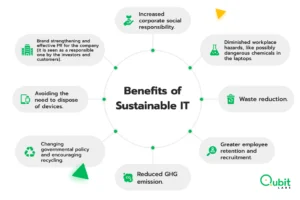IBM has been asking hundreds of CEOs about their main concerns for almost 20 years. Sustainability scored first in the most recent study, up 5 spots from 2021. Nearly 60% of CEOs reported that there is a considerable demand from investors for increased sustainability disclosure. Additionally, they sense pressure from various parties. Governments and regulators in the majority of the world\’s leading economies have created standards for company environmental impact disclosure. Customers choose to patronise sustainable companies. People are interested in investing in and working for these businesses. Every stakeholder, from the boardroom to the operations centres, wants to contribute to changing the world for the better.
Even though 86% of businesses claim to have a sustainability strategy in place, just 23% claim to be putting it into practise throughout their entire organisation. Due to the complexity of implementing sustainable practises and the lack of knowledge regarding where or how to have an impact, many organisations with good intentions are stuck in the planning stage. Despite this delay, the same IBV CEO poll indicated that 81% of CEOs are confident that sustainability initiatives will boost their own company\’s performance within the next five years. How do you translate strategy into outcomes?
Start building and implementing sustainability now.
An opportunity to innovate, make a difference, and develop exists through being more sustainable. Take action by doing the following three things:
Set defined environmental, social, and governance (ESG) goals for your company. To thrive, your business must implement these goals with great data discipline across the entire organisation.
Create the basis for your ESG data – Establish a distinct baseline to serve as the foundation for each goal so that you can assess your present impact, monitor your progress, and make improvements. To handle and integrate ESG data that is in line with your objectives, you need a single system of records. Collect, correlate, visualise, and analyse pertinent data so you can present verifiable, transparent, and financial-grade information and more quickly pinpoint areas that require improvement.
Operationalize your sustainability goals. You can then reap the full benefits by utilising the connections between this system of record for ESG data and the underlying operational systems that are used by all of your organization\’s departments and business units. You can automate feedback loops that allow actions based on insights once these relationships are established. Through intelligent facilities and assets, resilient IT infrastructure, and circular supply chains, these insights support sustainable change.
Intelligent infrastructure and resources— A smart place to start is by tracking and documenting operational data from your company\’s physical assets and real estate facilities. The information you gather can lead to significant energy savings, improved waste management, and predictive maintenance data that can assist cut down on unscheduled downtime.
Data centres offer many potential for enhancing sustainability. resilient IT infrastructure You may decrease energy use and get rid of unnecessary, outdated gear by updating your IT infrastructure with newer, more energy-efficient technology. Additionally, when working to achieve your sustainability goals, the same actions you take to strengthen business resilience across your organisation also assist you in enhancing client experiences and productivity.
Circular supply chains—More consumers are calling for reuse promotion and transparent sourcing information for the goods they purchase. Utilizing automated processes and implementing intelligent workflows can not only cut waste but also improve fulfilment and delivery routes with lower carbon footprints. You may move closer to a net zero supply chain with the aid of AI-powered and blockchain-supported solutions.
From Our Editorial Team
Our Editorial team comprises of over 15 highly motivated bunch of individuals, who work tirelessly to get the most sought after curated content for our subscribers.


